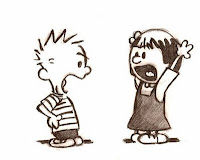It’s been a while since Hijab Obsession Part 1, but what can
I say? I only write when I am inspired. I AM SICK AND TIRED OF SISTERS TEARING
EACH OTHER UP ON FACEBOOK. Ok? Got me? It’s sickening. I usually friend any
sister who sends me a request. Since I never post anything super-personal, I
don’t mind building up my sister-to-sister connection. However, I am now rethinking
the whole social media thing.
I logged on last night to see what people were saying about
the election, and of course a lot of the Muslims were arguing about whether or
not to vote. I expected that. However, as I scrolled down I see a sister’s
post, “I am sick of seeing these sisters walking around with their niqab flipped
up!” Then the comments poured on about the sisters who “know they ain’t right”
wearing turbans or colors or this or that or blah blah blah.
My first thought was, Uh…
America just voted in a new President and this is the best you have to post?
Then I really felt disgusted that these sisters took time out their day to bash
other sisters for what they looked like on the OUTSIDE. And it made me think, dang,
I give ALL Muslim sisters salaams, are they thinking these things when they see
me on the street? Do they think that “I know I ain’t right?”
 Ok, so every judgment should eventually bring on some self-assessment
and reflection: Am I this judgmental? Yes, I love all my sisters and want the
best for them, but there was that
sister wearing a hijab with a lime green short set over the summer. And I sure
did call up one of my sisters and have a good laugh. SHAKE MY HEAD! This is not
appropriate behavior of a believing woman- period.
Ok, so every judgment should eventually bring on some self-assessment
and reflection: Am I this judgmental? Yes, I love all my sisters and want the
best for them, but there was that
sister wearing a hijab with a lime green short set over the summer. And I sure
did call up one of my sisters and have a good laugh. SHAKE MY HEAD! This is not
appropriate behavior of a believing woman- period.
We are not supposed to backbite ANYONE. But when it comes to
our sisters and brothers, we are actually supposed to look the other way and
make an excuse for them. Yes, we are supposed to educate them, but not in a way
to embarrass to make them feel lesser. And guess what, you may not be the one
who is qualified to educate them. Ever think about that? Here’s some suggestions
of what you could do next time you get your abayas in bunch and are about to
call up every sister you know to blast a brother or sister who, “know they ain’t
right.” That’s right put down your devices, and think before you post!
Example: You see a brother walk into a bar: Say to yourself,
“I bet that brother is going in there looking for someone.” Then forget you
ever saw him.
Example: You see a sister who wears niqab at the masjid in some
hot pink tight booty shorts: “As Salaamu Alaikum Sister! How are you these
days? Want to come to my house for some jasmine tea? We can read Qur’an or just
talk.” And this is the hard part: don’t tell anyone, whether she accepts your
invite or not! Then pray for her and for
yourself.
Example: Someone on facebook says something you really can’t
stand, instead of getting in a heating argument you either: 1- hide/delete them
or, 2- Say, “Alhamdulillah, Allah knows best my sister. I love you for the sake
of Allah. Masjid ____ holds classes on this subject every Sunday after taleem.
Salaam!”
We are all striving together! Don’t forget that. We must ask
ourselves: What would the Sahaba do?
"He who relieves a hardship of this Dunya (this earthly
life) or a believer, Allah will relieve a hardship of the Day of Resurrection
for him; he who makes it easy for an indebted person, Allah will make it easy
for him in the Dunya and the Hereafter; he who covers a Muslim (his mistakes
and shortcomings), Allah will cover him in the Dunya and the Hereafter; Allah
will be in the slave 's need, as long as the slave is in his (believing) brother's need…"
[Saheeh Muslim]
And when they hear
AlLaghw (dirty, false, evil vain talk), they withdraw from it and say: “To us
our deeds, and to you your deeds. Peace be to you. We seek not the
ignorant.”
(Surah Al-Qasas: Verse 55)


